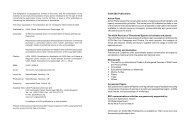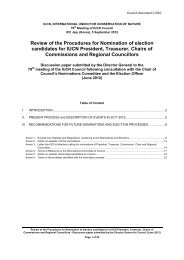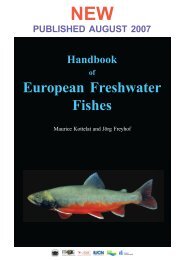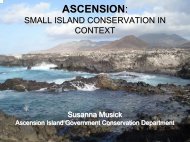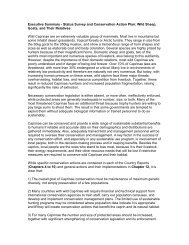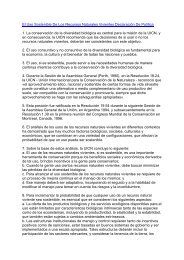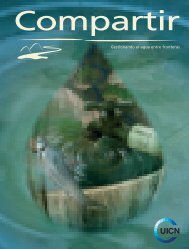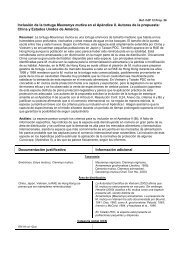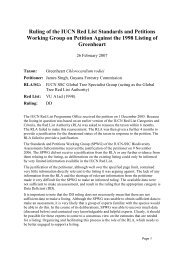Planning education to care for the earth - IUCN Knowledge Network
Planning education to care for the earth - IUCN Knowledge Network
Planning education to care for the earth - IUCN Knowledge Network
Create successful ePaper yourself
Turn your PDF publications into a flip-book with our unique Google optimized e-Paper software.
Pllanning <strong>education</strong> <strong>to</strong> <strong>care</strong> <strong>for</strong> <strong>the</strong> <strong>earth</strong>Canada: National Environmental CitizenshipInitiativeT. Christine HoganAbstractCanada aims <strong>to</strong> create a culture of environmental citizenship, inwhich in<strong>for</strong>med and educated citizens take voluntary action onenvironmental issues. The <strong>education</strong>al and community outreachactivities of Environment Canada have been organized around this<strong>the</strong>me. The five mutually-supporting objectives of environmental<strong>education</strong> are <strong>the</strong> establishment of an agenda; <strong>the</strong> development of<strong>education</strong>al products; partnerships <strong>for</strong> environmental literacy;specialist training; and intergovernmental cooperation.IntroductionCanada’s Green Plan aims <strong>to</strong> secure <strong>for</strong> <strong>the</strong> present and future generations asafe and healthy environment and a sound and prosperous economy. Onespecific goal stands out as <strong>the</strong> key <strong>to</strong> long-term change: environmentallyresponsible decision-making at all levels of society.The underlying reality is that setting right environmental ills in <strong>the</strong> longterm requires cooperation by all sec<strong>to</strong>rs. The traditional reliance onregula<strong>to</strong>ry and economic instruments <strong>to</strong> achieve policy is no longersufficient. Problems will not be solved by government action alone.Responsible voluntary action by all Canadians - stimulated by in<strong>for</strong>mationand <strong>education</strong> - is essential.The Canadian Government has been encouraging voluntary action <strong>for</strong>decades, but <strong>the</strong>re has never been such a concerted ef<strong>for</strong>t <strong>to</strong> engage o<strong>the</strong>rsec<strong>to</strong>rs as now. The time is right. In 1992, 84 percent of Canadians said<strong>the</strong>y believed <strong>the</strong> environment can only be protected if individuals are ready<strong>to</strong> make changes in <strong>the</strong>ir lifestyles - up from 73 percent six years earlier.Environment Canada staff across <strong>the</strong> country are helping Canadians <strong>to</strong> makenecessary lifestyle changes; <strong>to</strong> understand and address environmentalconcerns <strong>the</strong>mselves.One aim of Canada’s Green Plan is <strong>to</strong> create a culture of environmentalcitizenship which demands voluntary action on environmental issues by anin<strong>for</strong>med and educated citizenry. The more Canadians engage inenvironmental citizenship, <strong>the</strong> less need <strong>the</strong>re will be <strong>for</strong> complicatedregula<strong>to</strong>ry and economic regimes and <strong>the</strong> more ownership individuals willhave in <strong>the</strong> decision-making process that affects <strong>the</strong>ir daily lives (fig 1).In a national survey conducted <strong>for</strong> Environment Canada in 1991, Canadians95



